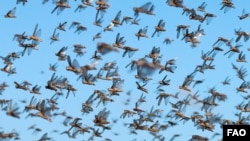The locust plague in Madagascar is getting much worse. More than half the nation is now infested. The U.N. says time is rapidly running out to bring the voracious insects under control.
The Food and Agriculture Organization began issuing warnings about migratory locusts in Madagascar in August of last year. It appealed for funds for control programs. But funding fell short and control programs stopped. The locusts did not. Locusts are usually found in southwestern Madagascar. But when conditions are right – like the rainy season – their population can soar.
This past March, the FAO announced the country was in the midst of a plague. It said at least 22 million dollars was needed by July. However, emergency appeals are described as “severely underfunded.”
FAO Locust Control Officer Annie Monard said that conditions could deteriorate sharply in the coming months.
“We think that at the end of the winter season – the cool and dry season -- locust infestations will be present on two-thirds of the island.”
The locusts wipe out any natural vegetation in their path, as well rice and maize crops. The FAO says rice and maize losses range from 40 to 100 percent on many plots.
“The plague will of course have a big impact on the cereal production. [It] will also have an impact on pastures. So that means that – not this year, but probably next year – there will also be an impact on the cattle – on the health of the cattle,” she said.
She said that food security and livelihoods of 13 million people are at stake. That’s 60 percent of the population.
The Food and Agriculture Organization said the 22 million dollars is needed now so a locust control program can be in place by September. That’s when the next cropping season begins. A complete three-year program -- to bring the locusts into what’s called a recession -- will cost more than 41-million dollars.
“If untreated, it could last for several years and be more and more important,” she said.
Regular control programs, she said, easily could have prevented the plague from ever happening. Despite a problem that’s now literally of biblical proportions, Monard said donors have been slow to respond.
“I think because the world is not so rich. There are a lot of other priorities. Also I think the current political situation in Madagascar is a bit difficult to assess for the donors and they could be a bit reluctant to invest. Yes, the plague will be stopped, of course. But after that, will the government be able to maintain a locust preventive strategy? So that is also a question that donors have.”
Madagascar has been in a political deadlock for the past four years as rivals battle for the presidency. Elections, which had been scheduled for July 24th, have been postponed until August 23rd. The United States has called on leaders to return the country to true democratic rule through free and fair elections.
The Food and Agriculture Organization began issuing warnings about migratory locusts in Madagascar in August of last year. It appealed for funds for control programs. But funding fell short and control programs stopped. The locusts did not. Locusts are usually found in southwestern Madagascar. But when conditions are right – like the rainy season – their population can soar.
This past March, the FAO announced the country was in the midst of a plague. It said at least 22 million dollars was needed by July. However, emergency appeals are described as “severely underfunded.”
FAO Locust Control Officer Annie Monard said that conditions could deteriorate sharply in the coming months.
“We think that at the end of the winter season – the cool and dry season -- locust infestations will be present on two-thirds of the island.”
The locusts wipe out any natural vegetation in their path, as well rice and maize crops. The FAO says rice and maize losses range from 40 to 100 percent on many plots.
“The plague will of course have a big impact on the cereal production. [It] will also have an impact on pastures. So that means that – not this year, but probably next year – there will also be an impact on the cattle – on the health of the cattle,” she said.
She said that food security and livelihoods of 13 million people are at stake. That’s 60 percent of the population.
The Food and Agriculture Organization said the 22 million dollars is needed now so a locust control program can be in place by September. That’s when the next cropping season begins. A complete three-year program -- to bring the locusts into what’s called a recession -- will cost more than 41-million dollars.
“If untreated, it could last for several years and be more and more important,” she said.
Regular control programs, she said, easily could have prevented the plague from ever happening. Despite a problem that’s now literally of biblical proportions, Monard said donors have been slow to respond.
“I think because the world is not so rich. There are a lot of other priorities. Also I think the current political situation in Madagascar is a bit difficult to assess for the donors and they could be a bit reluctant to invest. Yes, the plague will be stopped, of course. But after that, will the government be able to maintain a locust preventive strategy? So that is also a question that donors have.”
Madagascar has been in a political deadlock for the past four years as rivals battle for the presidency. Elections, which had been scheduled for July 24th, have been postponed until August 23rd. The United States has called on leaders to return the country to true democratic rule through free and fair elections.










